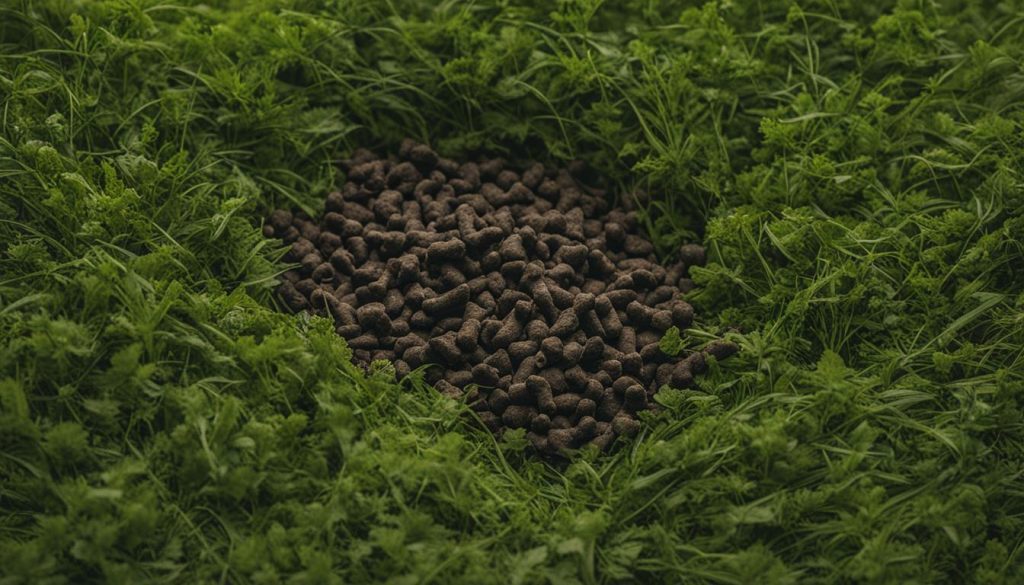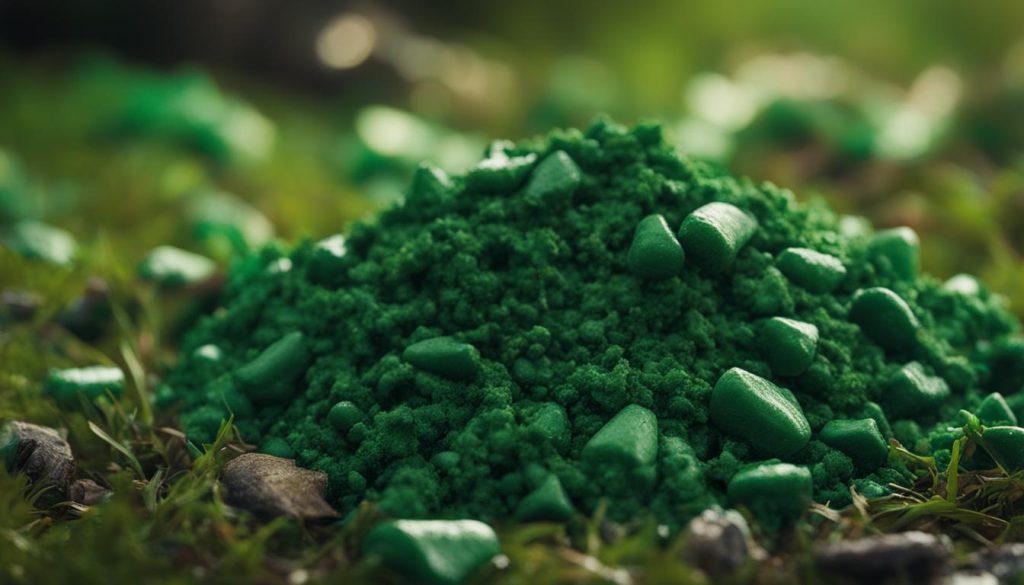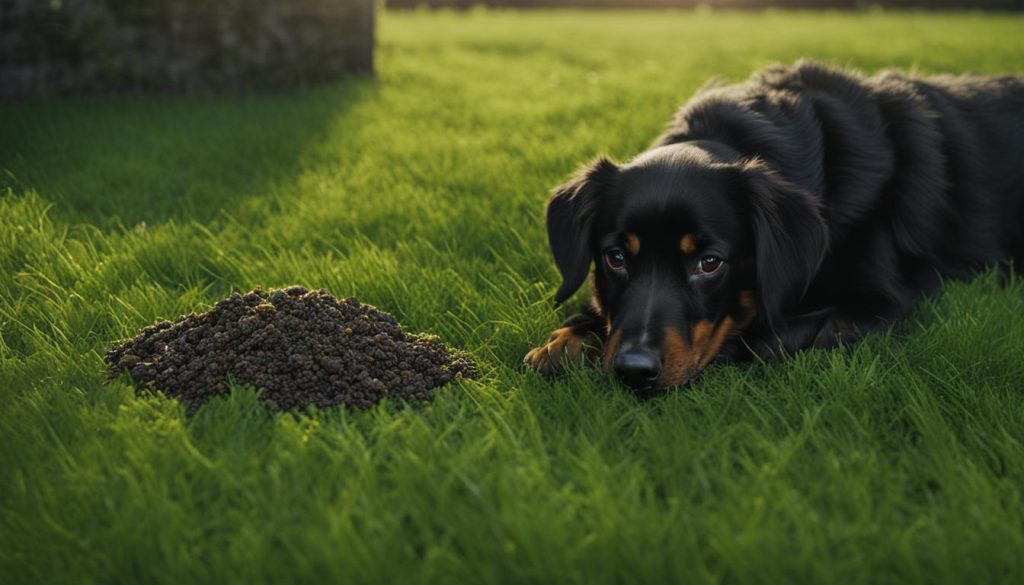Welcome to this comprehensive guide on why your dog’s poop may be green and what it could indicate about their health. As a dog owner, it’s essential to understand the potential causes of green dog poop and take appropriate action. While it can be alarming to see a change in your dog’s poop color, it’s not always a cause for immediate concern. Let’s explore the various factors that could contribute to green dog poop.
Key Takeaways:
- Green dog poop can be a sign of an underlying health issue.
- Causes of green dog poop include ingestion of grass or plant material, toxins, infections, and dietary factors.
- If your dog’s poop is consistently green or accompanied by other signs of illness, consult with a veterinarian.
- Regular monitoring of your dog’s poop and maintaining a healthy diet are crucial for their overall health.
- Preventive measures, such as avoiding toxins and gradual diet changes, can help prevent green dog poop.
Causes of Green Dog Poop
Green dog poop can be caused by several factors. Understanding these causes can help pet owners identify potential health issues and take appropriate action. Here are the main reasons why a dog’s poop may appear green:
Ingestion of Grass or Plant Material
One common cause of green dog poop is the ingestion of large amounts of grass or plant material. When dogs eat grass, the chlorophyll pigment can tint their poop green. This is usually not a cause for concern unless it is accompanied by other symptoms or persists for an extended period of time.
Toxins and Infections
Certain toxins and infections can also lead to green dog poop. Some toxins, such as those found in rat poisons or slug pellets, contain blue or green pigments that can affect the color of the poop. Infections, such as Giardia, can cause gastrointestinal symptoms, including green stool. If your dog has ingested a toxin or if they are showing signs of infection, it is important to seek immediate veterinary care.
Rapid Transit Time of Intestinal Contents
A rapid transit time of the intestinal contents, often associated with diarrhea, can result in the bile pigments not being fully broken down. This can cause the poop to appear green. If your dog has diarrhea and their poop is consistently green, it is recommended to consult with a veterinarian to determine the underlying cause.
| Cause | Description |
|---|---|
| Ingestion of Grass or Plant Material | Eating grass or plant material can tint the poop green. |
| Toxins and Infections | Ingesting toxins or having an infection can affect the color of the poop. |
| Rapid Transit Time of Intestinal Contents | Diarrhea and a quick passage of stool can result in green poop. |
It is important to note that while green dog poop can be a cause for concern, it is not always a sign of a serious health issue. However, if your dog’s poop remains consistently green or is accompanied by other signs of illness, it is recommended to consult with a veterinarian for a proper diagnosis and treatment plan.
Green Dog Poop and Toxins
Green dog poop can be a sign of the ingestion of toxins, such as certain rat poisons or slug pellets, which contain blue or green pigments. These toxins can cause serious health issues and should be treated as an emergency. If you suspect your dog has ingested a toxin, it is important to seek immediate veterinary care.
A study conducted by the American Veterinary Medical Association found that 36% of reported cases of green dog poop were caused by the ingestion of rat poison. This highlights the importance of keeping harmful substances out of your dog’s reach.
According to Dr. Emily Thompson, a veterinarian specializing in toxicology, “If you notice your dog’s poop is consistently green and your dog is exhibiting symptoms such as vomiting, loss of appetite, or weakness, it could be a sign of toxicity. It is crucial to seek veterinary care immediately to prevent further complications.”
| Toxin | Symptoms | Treatment |
|---|---|---|
| Rat poison | Green poop, vomiting, weakness, loss of appetite | Immediate veterinary care, induce vomiting if ingestion was recent, supportive care |
| Slug pellets | Green poop, tremors, seizures, difficulty breathing | Immediate veterinary care, decontamination, supportive care, antidotes if available |
Remember, prevention is key when it comes to keeping your dog safe from toxins. Keep household chemicals, medications, and harmful plants out of your dog’s reach. If you suspect your dog has ingested a toxin, do not try to induce vomiting without consulting a veterinarian, as some substances can cause more harm if brought back up.
Causes of Green Dog Poop

Green dog poop can be caused by various factors, including dietary choices, infections, and other underlying health issues. Understanding the causes of green dog poop is essential for pet owners to take appropriate action and ensure their dog’s well-being.
Dietary Factors
One common cause of green dog poop is the consumption of large amounts of grass or plant material. When dogs eat grass, it can affect the color of their poop, turning it green. Additionally, sudden changes in diet, especially if introduced too quickly, can also lead to green poop in dogs. Monitoring their food intake and gradually transitioning their diet can help prevent digestive upset and maintain normal poop color.
Infections and Other Health Issues
Infections, such as Giardia, can cause green dog poop. Giardia is a parasite that can infect dogs and result in gastrointestinal symptoms, including green stool. Other underlying health issues, such as food allergies or inflammatory bowel syndrome, can also contribute to the green color of a dog’s poop. If your dog’s poop is consistently green and accompanied by other signs of illness, it is important to consult with a veterinarian for proper diagnosis and treatment.
Toxic Substances
Green dog poop can also indicate the ingestion of toxic substances. Certain toxins, such as those found in rat poisons or slug pellets, contain blue or green pigments that can tint the poop green. If you suspect your dog has ingested a toxin, it is crucial to seek immediate veterinary care as these substances can cause serious health issues.
| Possible Causes of Green Dog Poop | Key Points |
|---|---|
| Dietary Factors | – Consumption of grass or plant material – Sudden changes in diet |
| Infections and Other Health Issues | – Giardia infection – Food allergies – Inflammatory bowel syndrome |
| Toxic Substances | – Ingestion of rat poisons or slug pellets |
Overall, green dog poop should not be ignored as it may indicate an underlying health issue. By understanding the potential causes of green dog poop and seeking veterinary care when necessary, pet owners can ensure their dogs receive the appropriate treatment and maintain their overall well-being.
Dietary Factors and Green Dog Poop

One of the possible causes of green dog poop is dietary factors. When a dog consumes large amounts of grass or other plant material, it can affect the color of their poop. The chlorophyll found in grass can tint the poop green, giving it a greenish appearance. Additionally, sudden changes in diet, particularly when introduced too quickly, can also lead to green poop in dogs.
It is important for dog owners to monitor their pet’s diet and ensure they are not ingesting excessive amounts of grass or plant material. Gradual changes in diet and a balanced nutritional plan can help prevent digestive upset and maintain normal poop color. Consulting with a veterinarian can provide guidance on proper feeding practices and ensure a healthy diet for your dog.
“Proper nutrition is essential for your dog’s overall health and can contribute to the normal color of their poop,” says Dr. Smith, a veterinarian at Pet Care Clinic. “If you notice persistent green poop in your dog, it’s important to evaluate their diet and make any necessary adjustments.”
Preventing Green Poop: Tips for Dog Owners
- Monitor your dog’s diet and avoid excessive consumption of grass or plant material.
- Make dietary changes gradually to minimize digestive upset.
- Ensure your dog’s diet is balanced and meets their nutritional needs.
- Consult with a veterinarian to create a proper feeding plan for your dog.
- Regularly check your dog’s poop for any changes in color or consistency.
By following these tips, dog owners can help prevent green dog poop and maintain their pet’s overall health and well-being.
When to Consult a Veterinarian
If your dog’s poop is consistently green and is accompanied by other signs of illness, such as diarrhea, mucus, or blood, it is important to consult with a veterinarian. Green poop in dogs can be a symptom of an underlying health issue, and a veterinarian can help determine the cause and provide appropriate treatment.
Additionally, if you suspect your dog has ingested a toxin or if they are exhibiting unusual behaviors, it is crucial to seek veterinary care. Some toxins, such as certain rat poisons or slug pellets, can cause green dog poop. Prompt medical intervention is necessary in these cases to minimize the potential harm to your furry friend.
A veterinarian will be able to perform a thorough examination, conduct necessary tests, and provide expert advice tailored to your dog’s specific condition. They have the knowledge and experience to accurately diagnose the cause of green dog poop and develop an effective treatment plan.
| Signs to Watch for: | When to Consult a Veterinarian |
|---|---|
| Consistently green poop | Accompanied by diarrhea, mucus, or blood |
| Unusual behaviors | Suspected toxin ingestion |
By seeking veterinary care when appropriate, you can ensure that your dog receives the necessary medical attention and potentially identify any underlying health issues early on. Remember, it’s always better to be safe and consult with a professional to address any concerns regarding your dog’s poop.
Next up: Section 7 – Tips for Preventing Green Dog Poop
Tips for Preventing Green Dog Poop

Preventing green dog poop is essential for maintaining your pet’s overall health. By following these tips, you can help ensure that your dog’s poop remains within a normal range of color:
- Monitor Your Dog’s Diet: Pay attention to what your dog eats. Avoid giving them excessive amounts of grass or plant material, as this can affect the color of their poop. Additionally, make gradual changes to their diet to prevent digestive upset.
- Avoid Toxins: Keep your dog away from substances that may contain toxins, such as certain rat poisons or slug pellets. These can cause serious health issues and lead to green dog poop. Be mindful of what your dog has access to in your environment.
- Maintain Regular Veterinary Check-ups: Regular visits to the veterinarian are important for monitoring your dog’s overall health. These check-ups can help identify any potential health issues that could contribute to green dog poop.
Please be aware that if your dog’s poop remains consistently green or is accompanied by other signs of illness, such as diarrhea or blood, you should consult with a veterinarian. They can determine the underlying cause of the green dog poop and provide appropriate treatment.
| Prevention Tip | Description |
|---|---|
| Monitor Your Dog’s Diet | Avoid excessive grass or plant consumption and make gradual changes to their diet to prevent digestive upset. |
| Avoid Toxins | Keep your dog away from substances that may contain toxins, such as certain rat poisons or slug pellets. |
| Maintain Regular Veterinary Check-ups | Schedule regular visits to the veterinarian to monitor your dog’s overall health and detect any potential issues. |
By implementing these preventive measures, you can help ensure that your dog’s poop remains within a normal color range, promoting their overall well-being. Remember, prevention is key when it comes to maintaining your pet’s health.
The Importance of Regular Monitoring

Regular monitoring of your dog’s poop is crucial for maintaining their overall health and detecting any potential issues early on. By paying close attention to the color and consistency of your dog’s poop, you can gather valuable insights into their digestive health and overall well-being.
One essential aspect of regular monitoring is observing the color of your dog’s poop. While variations in color can be normal, consistently green dog poop may indicate an underlying health concern. By consistently checking your dog’s poop color, you can identify any abnormal changes and seek veterinary care if necessary.
Table:
| Poop Color | Meaning |
|---|---|
| Brown | Normal and healthy |
| Green | Possible dietary factors or health issues |
| Other colors (red, black, white) | Significant health concerns |
Regular monitoring also involves assessing the consistency of your dog’s poop. This includes checking for signs of diarrhea, mucus, or blood. Consistently abnormal consistency, along with green color, may be indicative of an underlying infection or gastrointestinal issue. If you notice these signs, it’s essential to consult with a veterinarian for a proper diagnosis and appropriate treatment.
Remember to maintain a healthy diet for your dog and make gradual changes to avoid digestive upset. If you notice persistent green dog poop despite dietary adjustments, it’s important to seek veterinary care for further evaluation. Regular check-ups with your veterinarian can also help identify any potential health issues that could contribute to green dog poop and ensure your furry friend’s overall well-being.
Wrapping Up
After exploring the various factors that can contribute to green dog poop, it’s clear that this color variation is not always a cause for alarm. While it may indicate an underlying health issue in some cases, it’s important to consider the potential causes before jumping to conclusions.
Dietary factors, such as the ingestion of grass or rapid changes in diet, can affect the color of a dog’s poop. Additionally, toxins and infections can lead to green dog poop, requiring immediate veterinary attention. By monitoring your dog’s poop and seeking veterinary care when needed, you can ensure their overall health and well-being.
To summarize, if your dog’s poop remains consistently green or is accompanied by other signs of illness, it’s crucial to consult with a veterinarian. By taking preventive measures, such as monitoring their diet and avoiding toxins, you can help maintain normal poop color and contribute to your dog’s overall health.
FAQ
Why is my dog’s poop green?
Green dog poop can be caused by several factors, including the ingestion of large amounts of grass or plant material, the presence of toxins or infections, or dietary factors.
What are the common causes of green dog poop?
Common causes of green dog poop include the ingestion of grass or plant material, toxins or infections, rapid transit time of intestinal contents, and dietary factors.
Can green dog poop be a sign of a serious health issue?
Green dog poop can sometimes indicate an underlying health issue, especially if it is consistent and accompanied by other signs of illness. It is important to monitor your dog’s poop and seek veterinary care if necessary.
Should I be concerned if my dog’s poop is consistently green?
If your dog’s poop is consistently green, it is advisable to consult with a veterinarian to determine the underlying cause. Consistent green poop, especially when accompanied by other signs of illness, should not be ignored.
How can toxins cause green dog poop?
Toxins, such as certain rat poisons or slug pellets, can contain blue or green pigments that can tint your dog’s poop green. If you suspect your dog has ingested a toxin, it is important to seek immediate veterinary care.
Can infections cause green dog poop?
Yes, infections like Giardia can cause green dog poop. Giardia is a parasite that can infect dogs and result in gastrointestinal symptoms, including green stool. Other infections or intestinal disturbances can also lead to green dog poop.
How can dietary factors contribute to green dog poop?
Dietary factors, such as the ingestion of large amounts of grass or plant material, can affect the color of your dog’s poop and make it appear green. Additionally, sudden changes in diet can also lead to green poop. It is important to monitor your dog’s diet and make gradual changes to minimize digestive upset.
When should I consult a veterinarian about my dog’s green poop?
If your dog’s poop is consistently green and is accompanied by other signs of illness, such as diarrhea, mucus, or blood, it is important to consult with a veterinarian. Additionally, if you suspect your dog has ingested a toxin or if they are exhibiting unusual behaviors, it is crucial to seek veterinary care.
How can I prevent green dog poop?
To prevent green dog poop, it is important to monitor your dog’s diet and ensure they are not ingesting toxins or excessive amounts of plant material. Gradual changes in diet can help prevent digestive upset. Regular veterinary check-ups can also help identify any underlying health issues that could contribute to green dog poop.
Why is regular monitoring of my dog’s poop important?
Regular monitoring of your dog’s poop is essential for identifying any changes in color or consistency. By paying attention to your dog’s poop, you can detect potential health issues early on and seek veterinary care if necessary. Regular veterinary check-ups and maintaining a healthy diet can also contribute to maintaining normal poop color.






